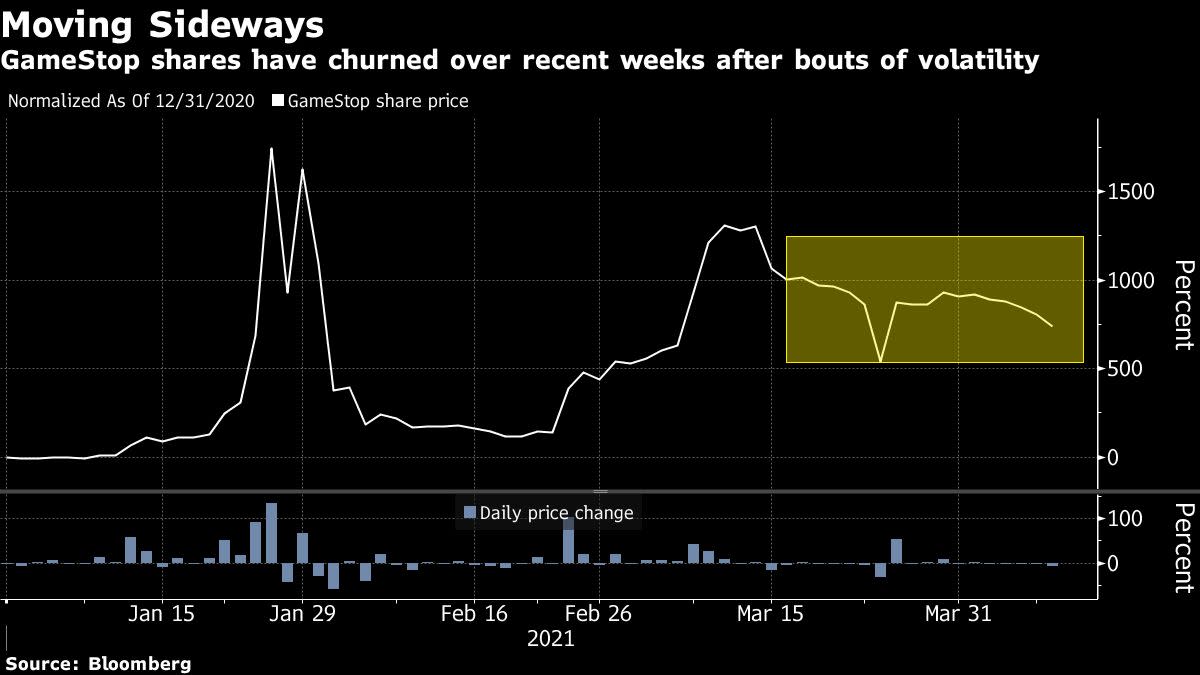GameStop Posts Longest Losing Streak in a Year as Shine Fades

Bloomberg
Coinbase Sails Toward $100 Billion Valuation on Crypto Frenzy
(Bloomberg) — Looks like Wall Street is about to get 100 billion new reasons to believe in Bitcoin.Coinbase Global Inc., the fast-growing exchange at the center of the speculative frenzy in cryptocurrencies, is expected to go public this week at a staggering valuation of about $100 billion. That’s more than the venerable New York Stock Exchange and Nasdaq Stock Market combined — for a company that didn’t even exist a decade ago.If all goes according to plan, Wednesday’s scheduled direct listing on Nasdaq will cement Coinbase’s position as the Big Board of the U.S. crypto scene and a potent symbol of the risks and rewards of the new era of digital money. Its founders, Brian Armstrong and Fred Ehrsam, own stakes worth $15 billion and $2 billion, respectively, according to Bloomberg estimates.The bottom line at the San Francisco-based exchange would seem to justify the sky-high valuation, at least recently. Coinbase said last week it expects to report first-quarter profit of $730 million to $800 million, more than double what it earned in all of 2020. And revenue in the first three months of 2021 probably surpassed all of the $1.3 billion total for last year. That compares with the $5.6 billion of revenue Nasdaq generated last year.Coinbase has 56 million verified users and adds about 13,000 new retail customers a day, according to cryptocurrency analytics firm Messari.“Coinbase is one of the most prominent cryptocurrency exchanges in the world,” Mira Christanto, an analyst who covers the company for Messari, said in a research report. “The market has shown that investors are hungry for crypto exposure through equity markets.”It’s an astounding ascent for a company started in a San Francisco apartment in 2012 by Armstrong and Ehrsam, who met online in a Bitcoin forum on Reddit. The apparent demand for Coinbase shares mirrors the appetite for all things crypto: Bitcoin has surged almost eightfold in the past year, hitting a record $61,742 in mid-March.The opportunity for Coinbase now is to capture the increasing number of institutional and corporate customers, such as MicroStrategy Inc. and Tesla Inc., that are buying Bitcoin for the long haul.“That’s going to be the Holy Grail for them if they can hold on to that business, because those folks are seen more as holders than traders,” said Julie Chariell, a senior analyst at Bloomberg Intelligence for fintech and payments firms.Providing additional products such as custody services might mean Coinbase could look more like a bank than an exchange in a few years, according to Chariell. “It’s a broader play, getting to be a one-stop shop for whatever you want to do with your crypto assets,” she said.Coinbase spokesman Elliott Suthers declined to make any company officials available for comment, citing the “quiet period” Coinbase is required to maintain before its Nasdaq listing.It’s been a long and sometime grueling road to the planned debut, and there are still risks to its business model.Coinbase disclosed in filings for the share sale that it had received a subpoena from the Securities and Exchange Commission. According to a person familiar with the matter, the inquiry was related to XRP, the digital token created by Ripple that’s the subject of an SEC lawsuit alleging it was sold as an unregistered security.That same month, the SEC announced it was suing Ripple and two of its founders for violating U.S. securities laws. Coinbase was forced to de-list XRP, which at the time was the third most-valuable cryptocurrency in the world.It’s difficult to tell how the loss of XRP affected Coinbase’s earnings because Bitcoin at the same time was skyrocketing to records, said Bloomberg Intelligence’s Chariell. A greater risk would be the need to de-list many of the alt coins Coinbase now offers if the SEC case determines XRP is a security.“It is a risk, definitely, but I just don’t think it’s a big risk at this point,” she said.Despite the XRP scrutiny, Coinbase’s expansion plans seem to be working. In 2020, coins on the exchange other than Bitcoin and Ether accounted for the largest revenue share, at 44%, according to its SEC filing.“It made economic sense for Coinbase to list high-demand tokens due to higher competition from other exchanges,” Messari’s Christanto said.Bitcoin LinkAnother risk: Coinbase’s fortunes tend to correspond to Bitcoin’s volatile history. The exchange only turned a profit last year as institutional demand for crypto assets propelled Bitcoin and other coins such as Ether to new highs. The recent lean years, known as the crypto winter, stretched from 2018 to 2019, with Bitcoin hitting a low of about $3,100 in December 2018. Until then, Coinbase was known for listing only the big hitters in the crypto world, including Bitcoin, Litecoin and Ether.Coinbase’s prospects won’t come down to a single token like XRP. The majority of its revenue comes from trading fees, with retail customers charged an average of 1.4% and institutional clients about 0.05%, according to Christanto.To get it through the lean years, Coinbase has conducted seven fundraising rounds for a haul of more than $500 million since September 2012, Messari research shows. That’s on top of the revenue from selling Bitcoin and Ether, which more than tripled last year to $134 million, according to Messari.All of that has provided a strong financial position for Coinbase to list publicly. Based on figures provided by the company, Chariell calculated that 5.5 million monthly users equates to $3 billion in 2020 revenue. The top 12 fintech firms to go public in the last six months have had price-to-sales ratios of 36 times, she said. Multiplying that by 2020 revenue gets you a very large number.“You’re easily over $100 billion in market cap,” she said.For more articles like this, please visit us at bloomberg.comSubscribe now to stay ahead with the most trusted business news source.©2021 Bloomberg L.P.




